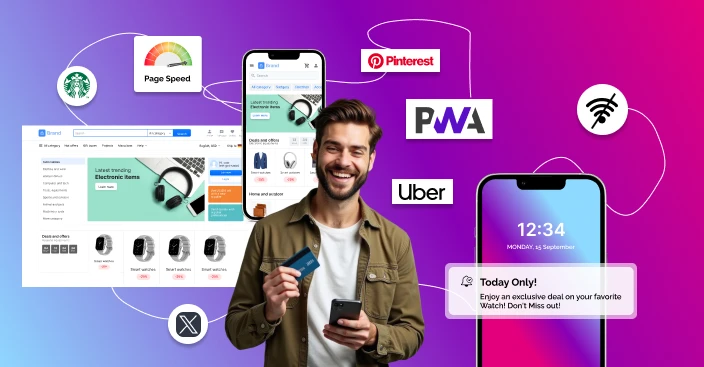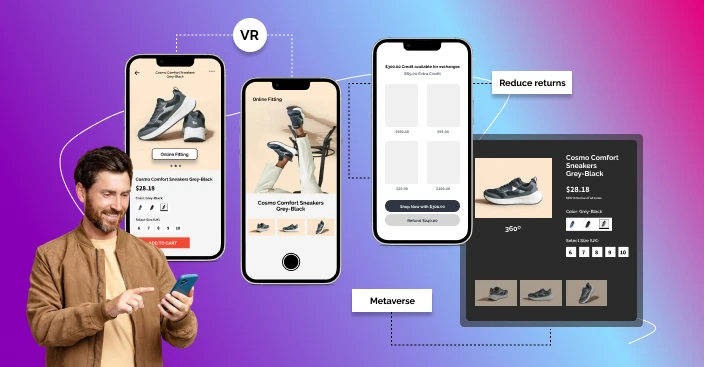2025 eCommerce Trends: From PWA to Voice Commerce

Table of Contents
The future of eCommerce in 2025 is based on advanced technology and changing consumer behavior. The companies should follow the trends if they want to remain updated and react to changing consumer demands.
In this blog, we will keep in mind the most influential eCommerce trends that are reshaping the future eCommerce for the market within this year, including Progressive Web Apps (PWAs), voice commerce, AI personalization, and the need for an omnichannel experience.
Benefits of Adopting 2025 eCommerce Trends
Enhanced User Experience:
PWAs and AR solutions provide quicker, interactive, and engaging purchasing experiences. Facilitating the visualization of products in situ, offline capabilities, and navigation without any hassles, companies can lower bounce rates by as much as a percentage point and keep customers engaged for longer, meaning better shopping experience.
Enhanced Conversions and Sales:
AI-based personalization and voice commerce provide simple, easy, and tailored shopping for consumers. Brands can increase conversion rate, larger average order value, and increase overall revenue with the support of personalized suggestions, real-time pricing, and voice search assistance.
Larger Customer Loyalty
With omnichannel strategies and subscription approaches, there is considerable interaction at every point of contact constantly. Heading to where people happen to be today—the internet, apps, social networks, or in the store—companies establish long-term connections that are translated into repeat business and loyalty.
Increased Market Reach
With the help of social commerce and voice commerce, businesses will be able to connect with new customers on top apps and voice devices. By reducing the critical gaps, brands can connect with everyday digital routines, reach more markets and meet people where they are in new and creative ways.
Competitive Advantage
Early embrace of new technologies like blockchain, personalization using AI, and AR makes companies trendsetters. As trendsetters to try out new technology, companies make it possible for organizations to gain some level of differentiation and become innovative solution providers.
Better Data Security and Trust
It is also necessary to maintain healthy data protection in the era of the Internet. Possession of customer data that is sensitive and being a law-abiding citizen is what gains customers’ trust, avoids breaches, and provides a secure platform for shopping.
Sustainability and Brand Reputation
Green marketing that is ethical and green brings together green consumers. Green resources, reduction in waste, and fair labor are ways of constructing brand reputation, loyal customers, and encouraging social responsibility.

Giant technologies revolutionizing web shopping experiences
Progressive Web Apps (PWAs)
Progressive Web Apps are revolutionizing eCommerce with instant launch, offline support, and an app-like experience without installing. That is an improved user experience and higher conversions.
Kaporal’s rollout of a PWA, for example, cut bounce rates by 60% and desktop conversions by 15%. (PWA Stats)
Voice-Controlled Shopping
Voice commerce is taking off, with the global market projected to rise to $150.34 billion by 2025 from $116.83 billion in 2024 at a compound annual growth rate of 28.7%.
It is being driven by increased adoption of voice assistants and smart speakers, compelling businesses to voice-optimize websites.
AI-Driven Personalization
Artificial Intelligence is propelling the personalization wave for eCommerce. Brands can provide a user-driven experience with the assistance of improved customer analytics. It will assist in suggesting niche-based products, dynamic prices, and market-specific campaigns to achieve better customer satisfaction.
Omnichannel Experience
Customers now want a seamless shopping experience anywhere and everywhere across channels such as websites, mobiles, social media sites, and physical stores. Omnichannel delivers the same customer experience everywhere, and hence customer satisfaction and loyalty.
Social Commerce
Social media has also served as an excellent sales channel through in-app purchases and in-streamable shopping feed postings that allow companies to sell to end-users directly.
Having social commerce on the eCommerce site has the potential to expand reach and boost sales since it is riding the wave of expanding social shopping experience.
Augmented Reality (AR) Shopping
Augmented Reality is revolutionizing e-commerce with the capability to enable customers to see products placed in the real world before buying them. Augmented Reality technology will be of most use in the fashion, interior, and cosmetics sectors to curb returnation and give assurance to consumers about purchases.

Blockchain for Transparency and Security
Blockchain. It is being researched in eCommerce as it has the potential to introduce security and transparency into transactions. As it has the ability to provide a tamper-proofed, decentralized book of record, blockchain can fight against fraud and become consumer-trustworthy, make the supply chain easy, and confirm data integrity.
Subscription-Based Models
Subscription eCommerce is increasing as it provides convenience and customized experiences to customers. Subscription on beauty products, food, and wellness products can result in repeat buying and customer loyalty for organizations.
Sustainability and Ethical Practices
Customers are most likely to consider ethics and environmental sustainability in the decision whether to purchase or not to purchase a product. Green companies that adopt practices of sustainable purchasing, waste reduction, and ethical treatment of workers can gain green consumers, build a good company reputation, and gain loyal customers.
Data Privacy and Security
Since most of the transactions are done online, security and protection of data were the biggest concern among consumers. The brand must establish a proper security measure to ensure consumer data protection to gain consumers’ trust and stay safe from the risk of data theft.
Conclusion
The eCommerce landscape in 2025 is changing quickly as a result of technology innovations, changing consumer behavior, and an increased need for effortless, personal experiences.
Voice commerce, Progressive Web Apps (PWAs), AI-driven personalization, omnichannel, and social commerce are changing customer relationships and eCommerce.
If companies are going to be tracking those trends, they don’t have a choice—innovative companies will build more advanced customer experiences, build customer loyalty, and lead the pack in rapidly changing eCommerce.
From subscription-based to AR shopping and sustainability, all of the new solutions drive more top-of-mind awareness, convert at a higher rate, and power long-term growth. Connect with an eCommerce expert for better implementation of PWA and voice commerce.
FAQs
 How are Progressive Web Apps (PWAs) transforming the eCommerce scene?
How are Progressive Web Apps (PWAs) transforming the eCommerce scene?
PWAs provide instant load times, offline support, and app-like performance without having to download them, which translates to greater user experience and conversion.
 Is voice commerce actually on the rise in 2025?
Is voice commerce actually on the rise in 2025?
Yes, voice commerce is on the rise along with the global market, which is forecasted to grow to $150.34 billion by 2025 at a compound annual growth rate (CAGR) of 28.7%.
 What are companies doing to get ready for AI personalization-fueled eCommerce?
What are companies doing to get ready for AI personalization-fueled eCommerce?
Companies can start this by using AI technology to sift through information of customers to give them personalized recommendations and exclusive offers, which equal customer loyalty and satisfaction.
 How important is omnichannel experience in the 2025 eCommerce environment?
How important is omnichannel experience in the 2025 eCommerce environment?
Omnichannel experience is extremely important since customers would like to have a single experience at every single one of their touchpoints, and this will be formed by increased customer satisfaction and loyalty.



